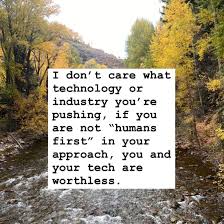From Atoms to AI: Do Tech Titans Feel Remorse?
Digital surveillance of our every movement. Facial recognition software. Deepfake technology designed to confuse or mislead. Ransomware. Online bots misshaping opinions. Tracking us on websites to sell us products. Three-dimensional printers used to print guns or suicide machines. Smart home and personal tech gadgets that spy on us, track us, study us, and listen to us. Biotech weapons. Genetically modified foods. Data centers that use incalculable amounts of electricity and water. Driverless cars that mistakenly kill or main. The list goes on and on.
Source: thebehavioralscientist.com
All of these dystopian technologies are out there right now. Someone somewhere thought they would be a good idea and developed the technology needed to employ these actions. The big questions are why and when does an invention become evil? Are there technologies that can be invented, but …
From Atoms to AI: Do Tech Titans Feel Remorse?
Digital surveillance of our every movement. Facial recognition software. Deepfake technology designed to confuse or mislead. Ransomware. Online bots misshaping opinions. Tracking us on websites to sell us products. Three-dimensional printers used to print guns or suicide machines. Smart home and personal tech gadgets that spy on us, track us, study us, and listen to us. Biotech weapons. Genetically modified foods. Data centers that use incalculable amounts of electricity and water. Driverless cars that mistakenly kill or main. The list goes on and on.
Source: thebehavioralscientist.com
All of these dystopian technologies are out there right now. Someone somewhere thought they would be a good idea and developed the technology needed to employ these actions. The big questions are why and when does an invention become evil? Are there technologies that can be invented, but should not be due to ethical, moral, or societal concerns? Are there inventions that are not evil for certain purposes, but become evil when used for misguided or inappropriate functions?
“Just because it can be invented, doesn’t mean it should be.”
panethos.wordpress.com
J. Robert Oppenheimer expressed guilt (“I have blood on my hands”) and regret after use of the atomic bomb on Japan, especially Nagasaki. As he so aptly noted, “The physicists have known sin…and this is a knowledge they cannot lose.” He spent much of his life thereafter trying to rein in the terrible technology that he helped to create.
“The link between Hiroshima and Dresden was indiscriminate bombing, what the Allies called total war. But it was deeper than that; it was something about man’s inhumanity to man, about technocrats who valued demonstrations of know-how so much they lost sight of the fact that they were killing people: schoolgirls and geezers and mothers pushing babies in prams.”
“The Brothers Vonnegut” by Ginger Strand
Today, it seems moral/ethical debates as those cited by Mr. Oppenheimer are fewer and further between. The general philosophy seems to be, if it helps the company’s bottom line or can make one rich, then it is good. Beyond that, there seems to be no limitation to how rich one can become whether or not the wealth was generated by evil technologies.
“Isn’t there a point where so rich is too rich?”
panethos.wordpress.com
- Have we heard regret for technology and modern weapons used to obliterate Gaza?
- Have we heard regret for providing technologies that assist ICE?
- Have we heard regret for allowing lies to permeate across the web?
- Have we heard sorrow or dismay for those who will lose their jobs to AI?
- Have we heard any thoughtful regret for any evil products created by Tech Titans?
Heck. When Google was first becoming a household name some 25 years ago, the company’s motto was “Don’ Be Evil.” This was removed from the preface of the employee code of conduct in 2018 and relegated to hardly more than an afterthought. Given where technology has taken us since, it is doubtful that goodness is true for any major tech company any more.
Author Kurt Vonnegut, Jr. went to great lengths in his poignant writings to raise ethical concerns about the misuse and abuse of technology during his storied career. Here are two examples of the concerns he noted:
“It wasn’t necessarily evil to invent Ice-9 or a machine to replace a human being, like OMIBAC, EPICAC, or the ‘contour-following system’ [three fictional techologies in his books] that made skilled workers obsolete. but it was unethical to do these things without thinking about the implications for humanity.”
“The Brothers Vonnegut” by Ginger Strand
“The danger of the technocratic worldview was that it made human conflicts, human drama, even war, into a kind of game.”
“The Brothers Vonnegut” by Ginger Strand
Source: instagram.com
As citizens of this nation and planet we must work together to formulate a series of ethical standards and protocols to be met by all parties (individuals, corporations, nations). Whether this is done through the United Nations, global agreements, or through non-government organizations doesn’t matter. What’s necessary is some form of treaty or failsafe to rein in the proliferating evils that derive from technological advancements and untethered greed, and to hold those accountable when advancements are employed for evil purposes.
#apologies #biotech #books #digital #ethics #evil #futurism #history #KurtVonnegut #militarism #morality #Oppenheimer #streaming #technology #transportation #weapons

























